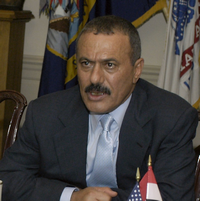The fall of Tunisia's President Zine el-Abidine Ben Ali is the latest reminder of how difficult it can be to encourage "friendly autocrats," in the Middle East and throughout the world, to undertake reforms. It's likely that, in light of Ben Ali's fate, Yemen's President Ali Abdullah Saleh is reassessing the advice that Secretary of State Hillary Clinton gave him during her visit earlier this month about moving ahead with political liberalization.
But policymakers in Washington are apprehensive as well. Ben Ali's government was often described as a "liberal autocracy," where the state propagated a version of Islam more compatible with liberal values than the Islamism that animates the Muslim Brotherhood in neighboring Egypt. The Tunisian government was also supportive of the U.S.-sponsored peace process with Israel, and was a "key ally in the fight against terrorism." Back in 2003, I myself categorized Tunisia (.pdf) as a "liberalizing one-party state" and wondered whether it was heading in the direction of becoming a "North African Singapore." Just last year, the World Bank's assessment of Tunisia was generally quite positive, noting, among others things, that, "Tunisia has made remarkable progress on equitable growth, fighting poverty and achieving good social indicators." The bank pointed to the country's steady increase in per capita income and public investment in infrastructure and human capital as playing key roles in reducing poverty.
Washington is not alone in trying to cope with the fallout from Ben Ali's sudden removal. Successive French governments have supported the Tunisian regime, praising its commitment to economic development, educational achievement and upholding women's rights, as well as its firm stance against Islamist extremism. Indeed, Foreign Minister Michele Alliot-Marie had even offered French assistance in training Tunisia's security forces to deal with violent protests in the days immediately prior to Ben Ali's ouster.

